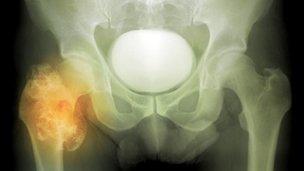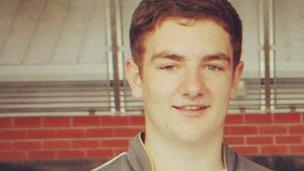Call for early bone cancer diagnosis
- Published

Bone tumours can be misdiagnosed as sports injuries
A charity is urging GPs to do more to diagnose bone cancers early in order to help to improve the survival rate
The Bone Cancer Research Trust says the survival rate of 54% has barely changed in the last 25 years.
It says early diagnosis is key to spotting the condition, which mainly affects young people.
Symptoms include painful bones or swollen joints, which can be misdiagnosed as sporting injuries or "growing pains".
Primary bone cancer is cancer which starts in the bones rather than spreads there.
The two most common types are osteosarcoma and Ewing's sarcoma.
The condition is rare - there were just 531 new cases in the UK in 2010.
But it is an aggressive cancer, and those who survive are often left with significant disabilities.
The trust has teamed up with the Royal College of GPs to launch a specialist e-learning module to help doctors spot the symptoms and diagnose patients earlier.
Prof Andy Hall, chairman of BCRT's independent scientific advisory panel, said: "Primary bone cancer is, thankfully, very rare but it is vital that it is diagnosed early to give patients the best chance of survival."
He added: "The average length of time it takes for a patient to receive a correct diagnosis is 16 weeks from the time when the patient first noticed their symptoms.
"A simple X-ray, performed early, can make all the difference."
'Diagnosed on my birthday'
Callum Flynn, 18, from Leigh in Greater Manchester, experienced knee pain for 18 months before being diagnosed with osteosarcoma - on his 14th birthday.
"I would wake up with my knee locked. I couldn't stand up. That would last for about two weeks at a time - and it happened five or six times over an 18-month period.
"We kept going to the walk-in centre, because it seemed to be something that just happened overnight, and they thought it was a virus each time.
"But eventually I went to my GP who felt behind my knee and obviously felt the tumour, though I wasn't told then. I had an X-ray and a biopsy in the space of a week and a half."

Callum Flynn: "It just took one X-ray"
His diagnosis came as a shock. "I'd never heard of it. I didn't think you could get cancer when you were young."
Callum had to have chemotherapy and a full knee replacement at the time, and has recently had to have a further operation on his knee.
He cannot play all the sports he used to, although he is part of the England physical disabilities cricket squad, and toured with them in Dubai last year.
Callum also works to raise awareness of bone cancer and funds for research.
He says his experience of going undiagnosed for 18 months means he feels it is vital to raise awareness about early diagnosis.
And in the end, he says, it is simple to check: "It just took one X-ray."
- Published19 August 2013
- Published18 June 2013
- Published8 October 2012
- Published7 June 2013